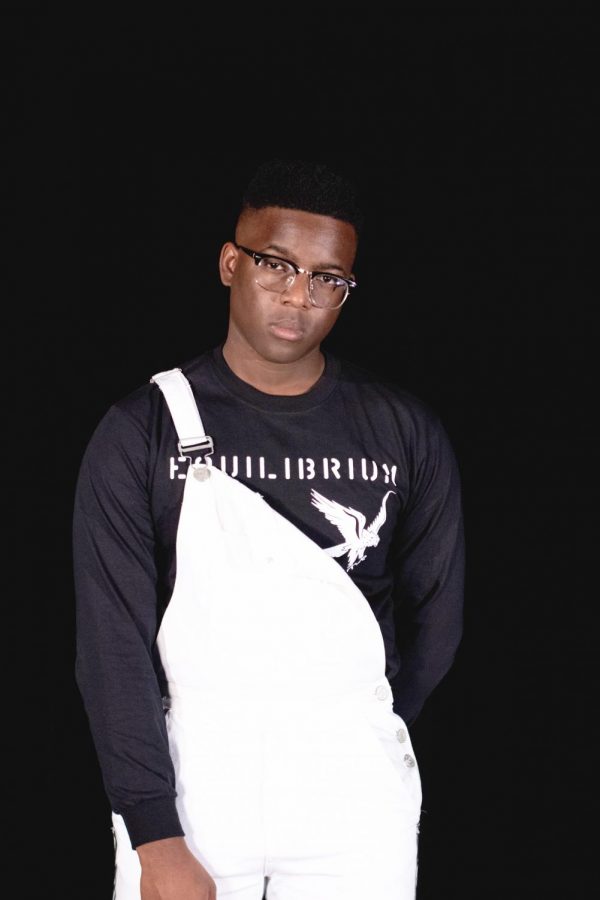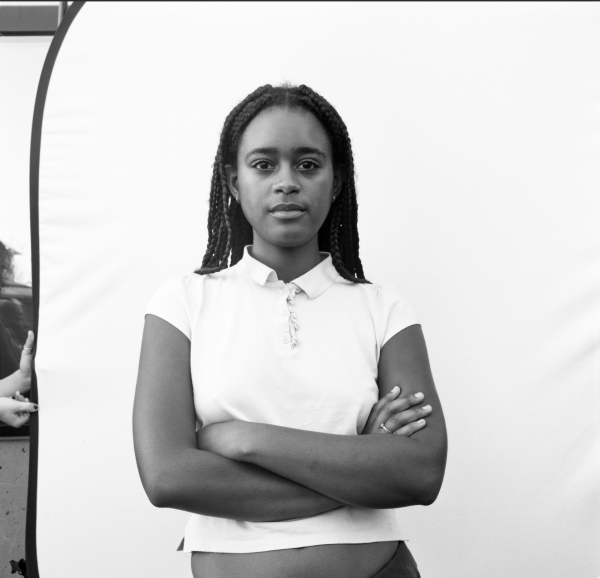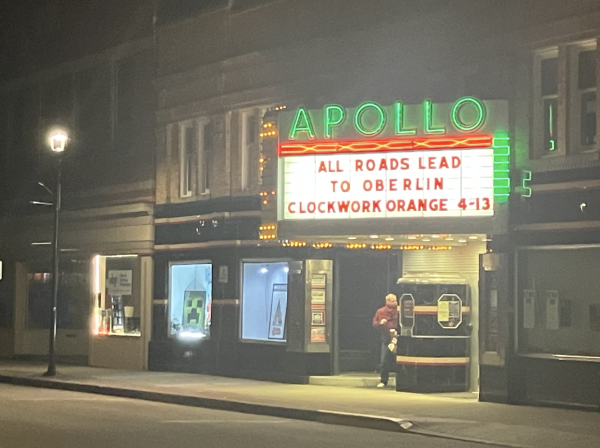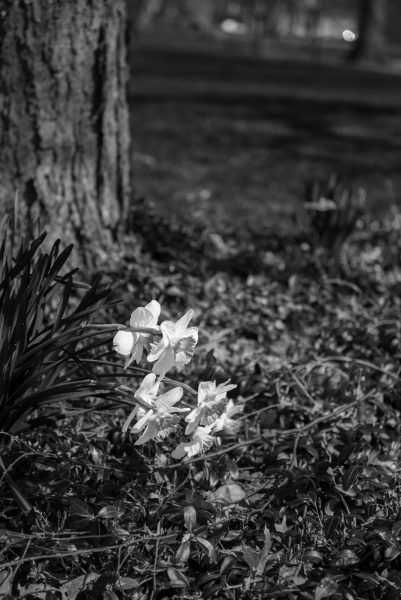Cyril Amanfo, “Equilibrium” Student Playwright, Director
College second-year Cyril Amanfo.
College second-year Cyril Amanfo is a Neuroscience and Theater double major from Lowell, MA. Last year, Amanfo was the assistant stage manager for Professor of Theater and Africana Studies Caroline Jackson Smith’s staging of BJ Tindal’s, OC ’16 play, What We Look Like, an experience that inspired Amanfo to try his hand at putting on a play. Amanfo is writing, directing, and acting in the resulting show alongside a cast of nine and design team of seven. The result is a bold fusion of dance and spoken word called Equilibrium, an Oberlin Student Theater Association show running Dec. 5, 6, and 7 at 8 p.m. in Wilder Main Space.
This interview has been edited for length and clarity.
Can you describe Equilibrium?
Equilibrium is very, very abstract. It essentially is this take on life, put on stage. It basically deals with things like who we are as people and [what motivates] us to do different things. You get four different pieces of equilibrium, and they’re based on the four elements — there’s fire, water, earth, and air, and each piece has its own narrative. You get to watch three characters within each piece deal with their own narrative, telling their own story that fits into this bigger story — this bigger exposé-type-thing on life and what it takes to live it. I have a thing about putting abstract things on stage, things that people haven’t seen before. This is the most abstract I’ve gotten.
You called it a choreo-poem. Can you talk more about what that means?
A lot of it is a mixture of spoken word to dance, so there are very poetic aspects of the show. It’s not your typical dialogue — this person speaks to that person — it’s more people speaking to the audience or people speaking to each other, but in some sort of poetic setting. There are little words and tricks that [make you think,] “Oh, okay, I caught onto that.” So that’s the poetry aspect, and then there are about 13 or 14 movement sequences, dance, that help emphasize the story and push the story along as well.
Did you write the entire script before starting work on the performance?
I started writing the script in February of this year and finished it before I cast the show. I ran it by a couple of people to edit and to read to make sure that [I wasn’t the only one that thought] that it sounded good. My approach to directing was like, “These are the words on the page, but what brings them to life is different.” So [the cast and I] collaborated [on questions like]: “When are you on stage? When are you exiting?” I didn’t want to do blocking in the sense of telling people where to go — I was just like, “Go where you want to and if it looks bad, I’ll tell you and we’ll try something else.” The script is just words on a page and obviously that’s important, but also what comes after that, I think, is a lot more important and needs to be collaborative. It’s a 10-person cast, including myself. My stage manager, my assistant director, everyone working on the show, were like, “Let’s all put it together based off of what we have on the script.”
Are you performing in the show?
I am performing in the show. It’s kind of a lot, I’m not going to lie. It’s my little Lin-Manuel Miranda moment. But it’s been fun. It doesn’t feel overwhelming just because I have a really good support system in the cast and the crew and everyone working on it.
When did you first get the idea to do the show?
I started writing it at the end of Winter Term [2019]. What We Look Like was a show that was written by BJ Tindal, OC ’16, and they wrote the show and did it a couple times while they were here, and then Ms. Caroline picked it up. Being [part of] that process and seeing what an original show looks like — a recent original show — I was like, “I’m going to do something like that.”
I’ve always been thinking about, you know, when am I going to take control and write something? I auditioned for a lot of shows last year and I didn’t get a lot of them and some people just told me, “If you don’t get opportunities, create your own.” And so I really didn’t know where I was going. At some point I was just writing some poetry — putting these words together because I thought they were important things — that were on my mind at the time. These existential-crisis questions that you have sometimes and you’re like, “Why are we really here?” And as I was writing, I was like, “I could turn this into something bigger.” So I started editing those and making it a cohesive story [and that] is what led to Equilibrium.
Can you talk about your relationship with your student design team for this show?
[College second-year] Windley Knowlton is my stage manager. She’s probably the best person I know. She is also a theater person and so she’s not only a stage manager keeping us all in check, but she also knows what good acting looks like; she knows what good choices look like. … We wouldn’t be opening this week without Windley Knowlton, that’s just a fact.
[College second-year] Analise LaRiviere was the choreographer. The collaborative process in choreography was really interesting because I’m not a classically-trained dancer, but I am a dancer, and Analise is a classically-trained dancer. So the two of us making this choreography together was a lot of trial and error, a lot of back-and-forth, bouncing ideas, all of that. A lot of just get up and dance and see what comes out of it. We’ve created some really, really cool pieces that way — by just getting up and dancing and dancing with each other. We work really well together, [which has] been a lot of fun.
[College fourth-year] Clarissa Heart is my assistant director and she is just smarter than I’ll ever be. So the goal is to surround myself with people who I respect and who can hold it down. Clarissa is just an incredible, incredible creative talent.
[Double-degree fourth year] Max Addae is doing sound. [College second-year] Daniel Moses is doing lights. [College first-year] Kobi Gomes just jumped on and is doing costumes. … You’ve got this group of seven open-minded people who want to create this thing from the ground up, and obviously I’m the director and I have the final say, but it’s never come to the point where I had to be like, “Absolutely not” … because all of the ideas are so good that we found a way to weave and incorporate all of those different things.
Is there anything you want people to be thinking about going into the performance?
Be ready to be affected. Come in with an open mind. Like I said, it’s not anything that I’ve ever seen on stage before. … Call and response is a big part of the show. Audiences are welcome to engage — if you have something to say, you should say it, not in the sense of interrupting the show, but if you want to laugh, you should laugh. If you want to cry, you should cry. If you want to throw in a “mm-hmm” or some snap[ping], that is really necessary for this show.
Once you step into the theater, you’re basically in the show. The actors will interact with the audience. They will get up, they’ll go talk to people; they expect the audience to listen to them, and they expect to listen to the audience. … I feel like if you do come in with an open mind you will leave with something. And I think that’s what the point of theater is.
Anything that you’d like to add?
The cast is incredible. I talked about the design team, but the cast is absolutely incredible… I can honestly say right now that I couldn’t have cast anybody else, nor could I have cast anybody in any different role. The way that this cast is set up right now is borderline perfection, and that’s not only because of the talent, but it’s also because of the hard work. I have a lot of people who are like, “I’ve never acted before.” A lot of people who have never danced before, and now they can all say that they are actors, dancers, and they all also sing on the track. So it’s a whole triple-threat type of thing where they came into it really not knowing what they were getting into … because it is a very abstract thing. But now we’re at show week and we’re all really, really confident in terms of what we’re doing. … I’m really excited for the cast, mostly — to be able to share this experience.









